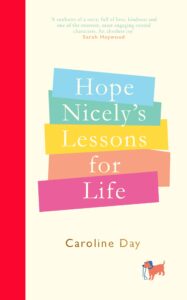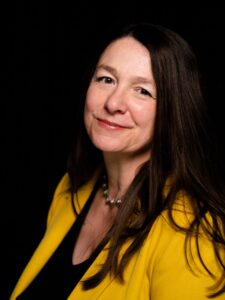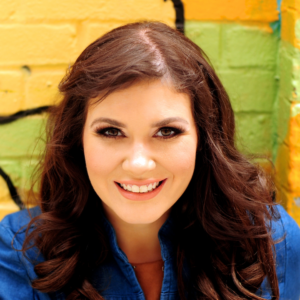Caroline Day – Hope Nicely’s Lessons For Life
30 September 2021
 We are delighted to welcome Joan Hessayon Award winner Caroline Day to the blog to talk about her award-winning debut novel, Hope Nicely’s Lessons for Life. Caroline, tell us a little about your book. Where did your inspiration come from?
We are delighted to welcome Joan Hessayon Award winner Caroline Day to the blog to talk about her award-winning debut novel, Hope Nicely’s Lessons for Life. Caroline, tell us a little about your book. Where did your inspiration come from?
Hope Nicely is a young woman who has joined an evening writing class because she wants to write her autobiography. She believes this will change her life. Hope has FASD (Foetal Alcohol Spectrum Disorder) and because of this other people have not always been very kind to her. She has a job as a dog walker, and largely prefers dogs to people. But in the course of the book she will discover a lot about friendship, and about herself. In terms of inspiration, people keep asking me where Hope ‘came’ from, and the truth is I’m not altogether certain. My novel began life as a national novel writing month (NaNoWriMo) exercise and in the beginning, I had a name – Hope Nicely and a premise that she wanted to write her story. Everything else grew from there.
Your main character is an adoptee with Foetal Alcohol Spectrum Disorder. What was your research process like? What made you want to write a character with FASD?
I did not start writing my book with an agenda of any sort. In fact when I wrote the first page, I did not yet know that Hope had FASD, but I had this sense of a distinctive voice and of a protagonist who never quite knew what she was going to say or do next.
As a family and health journalist, I had come across the condition FASD and, years earlier, I’d interviewed the mother of a young boy who had it. I’d been moved by their story. Now, with Hope’s voice beginning to feel real in my head, I realised that this would give meaning to her story. FASD is a lifelong neuro-developmental condition caused by prenatal alcohol exposure. It will impact different individuals in vastly different ways, and although many people have not heard of it, research shows that it affects a significant percentage of the population. One recent survey by Adoption UK found that 8 per cent of adopted children in Britain had a diagnosis and a further 17 per cent were suspected of being on the FASD spectrum by their parents.
In terms of research, while I wrote the novel quickly, I did extensive research – from blogs and charity websites to medical articles – and much editing. But my biggest debt of gratitude is to a group called FASD Awareness and to its co-founder Tracy Allen who is an incredible woman and who has been extremely generous with her time, feedback, help and encouragement.
Writing Hope Nicely’s Lessons for Life was a real education for me.
Hope Nicely’s Lessons for Life is written in first-person point-of-view. What were the biggest challenges of writing Hope’s POV?
It is not only a first-person point of view, but also a very close first-person one. The reader is essentially right there inside Hope’s head at every moment, and there is an element of the stream of consciousness about it all. I wrote this book in the present tense, which makes it an even closer perspective. As an author, that did present challenges – you might say I chose to make a rod for my own writer’s back – when writing dialogue or action, for example. But on the other hand it gave me the possibility to convey the sense of what it is like to be Hope.
What is your writing day like? Do you write early in the morning or after everyone’s gone to sleep? Do you go to a coffee shop to write or do you have a nook in your house? Do you have to balance writing with other obligations, and if so, how do you make it work?
I worked from home long before Covid enforced it on so many of us. As a freelance journalist and consultant editor, balancing working from home with bringing up two children, I have always veered between believing that, clever me, I’d chosen the best possible life (I could be there for school pick up and fit writing around being a mum), and wondering why I’d choose to live this way (no office to escape to, no workmates to chat with, and deadlines eking into family life.)
 My children are now older which makes everything easier. I take my hat off to those authors who have full time jobs and young children and still write novels.
My children are now older which makes everything easier. I take my hat off to those authors who have full time jobs and young children and still write novels.
In terms of my writing day, I’m a laptop and dog-by-my-side sort of writer. I don’t have a specific spot. I’ll do sofa (so bad for my back!) then table and move around rooms throughout the day, but I do like it to be quiet. I do a dog walk in the morning where I gather my thoughts and then come home to write. And I try not to keep writing too late at night, although I do often find that is when my brain is working through the story and finding solutions.
Tell us a little about your path to publication. How did you get your book deal?
I was extremely lucky because the wonderful Sarah Lutyens of the literary agency Lutyens & Rubinstein, fell in love with Hope Nicely and offered me representation, so when it came to submitting to publishers, I knew that I was in safe hands. And my editor, Sarah Bauer and the team at Zaffre who published Hope Nicely’s Lessons for Life are so fantastic – I love that they are a relatively new imprint at a big publisher (Bonnier Books UK).
As someone who had always worked for national newspapers and magazines, the process of book publication was fascinating and I really enjoyed the editing, as well as seeing the early thoughts for the cover, etc.
My book was published on 22 July – which was later than first planned due to Covid. It was Goldsboro Books Book of the Month that month, and also made the Sunday Times Bestseller List for hardback fiction. Yes, I’m still pinching myself and yes, I still have to stroke my book occasionally to make sure it’s real.
As a graduate of the New Writers’ Scheme, how did the program impact your development as a writer? What’s the best piece of advice you received in your reader reports?
The New Writers’ Scheme is quite simply the most fantastic resource on offer to unpublished writers of romantic fiction, in all its guises, and I am so incredibly grateful to my – anonymous – reader. The fact that somebody who is a published, professional author has taken the time not only to read, but to give such in-depth consideration and feedback on your full manuscript is absolutely invaluable. In terms of development as a writer, I think we all have that sense of ‘imposter syndrome’ and having your manuscript appraised so fully by somebody who knows the industry is very much a first step in holding your head up and feeling that actually you are a real author and receiving positive feedback is such a confidence boost.
In terms of advice, my WONDERFUL reader actually told me to start sending Hope Nicely’s Lessons for Life out to agents which was, without a doubt, the best advice I could have received. Otherwise, I might still be editing and trying to drum up the courage…
You also studied on a Curtis Brown Creative course. Are there any other educational resources you’d recommend to writers who are either just getting started or want to further develop their craft (ex. writing courses, craft books, etc.)?
I did! The Curtis Brown Creative course – which I did with the wonderful Charlotte Mendelson as my tutor – really helped me to focus and to hone my thoughts. Although I was working on a different book idea at the time, it very much helped me to find my feet and my identity as a writer. It also taught me that there are a lot of very talented writers who are hoping to be published and that luck will always play a big part in that.
It helps to share with other writers and readers and I have also attended the writers’ group at a local bookshop (The All Good Bookshop in North London) for many years. And of course, in terms of help and support, the RNA has so much to offer online and in person.
My own writing bible – and this is not terribly original – is Stephen King’s brilliant On Writing. Part autobiography and part writers’ guide. I find its clarity is great motivation. It crops up in my novel because the chapter names mirror the structure of a novel, and with Hope Nicely attending her writing classes, there are plenty of references to writers and writing guides. Hope would tell you the number one rule for any writer is always ‘show don’t tell’.
What’s your revision process like? How many drafts do you go through before you’re ready to show the work to your agent/editor?
Having worked as both writer and editor, I find the two are often competing and it is a real effort for me to write as I go along without editing too. I have to tell myself to put it all down on the page first – and then revise, but I can’t always resist the temptation to polish as I go along.
What was it like to win this year’s Joan Hessayon Award?
In a word – unbelievable. I couldn’t believe it when my name was read out by Jean Fullerton (I think anybody who was at the York tea will have noticed that I was a little bit surprised!), and I’m not sure I quite believe it even now. This is a unique and very special prize. I was thrilled enough to be a contender, but Hope Nicely’s Lessons for Life is not what anybody would describe as a typical romantic novel – and I absolutely did not expect that it would be chosen as the winner. I think it is testament to the broad remit and inclusive nature of the RNA that a novel like this one could be given this wonderful accolade.
Can you tell us anything about your next writing project?
I have written my next book and I’m just knocking it into (hopefully) good shape. I would say that the broad themes are not dissimilar to Hope Nicely’s Lessons for Life – friendship, love and acceptance and finding your own way in life. I’m quite superstitious about talking about it – but I hope people will like my new characters as much as they seem to have liked Hope Nicely.
About Hope Nicely’s Lessons for Life
Hope Nicely hasn’t had an easy life.
But she’s happy enough living at 23 Station Close with her mum, Jenny Nicely, and loves her job, walking other people’s dogs. She’s a bit different, but as Jenny always tells her, she’s a rainbow person, a special drop of light.
It’s just – there’s something she needs to know. Why did her birth mother abandon her in a cardboard box on a church step twenty-five years ago? And did she know that drinking while pregnant could lead to Hope being born with Foetal Alcohol Spectrum Disorder?
In a bid to find her birth mother and the answers to these questions, Hope decides to write a book. Despite having been bullied throughout school, she bravely joins an evening class where Hope will not only learn the lessons of writing (including the number one golden rule of ‘show don’t tell’) but may also begin to discover more about the world around her, about herself, and even make some (human) friends.
But when Jenny suddenly falls ill, Hope realises there are many more lessons to come.
Caroline was talking to Victoria Chatfield.
 Victoria Chatfield originally hails from New York where she worked as a social media manager in the fashion industry. While she started out as a ghostwriter for magazine editors, she’s now a member of the NWS, writing romantic suspense and psychological thrillers. (She loves the really bad boys.) Find her on Facebook and Twitter at @vavazquezwrites.
Victoria Chatfield originally hails from New York where she worked as a social media manager in the fashion industry. While she started out as a ghostwriter for magazine editors, she’s now a member of the NWS, writing romantic suspense and psychological thrillers. (She loves the really bad boys.) Find her on Facebook and Twitter at @vavazquezwrites.



